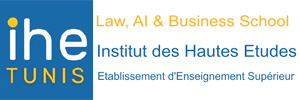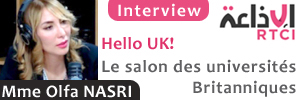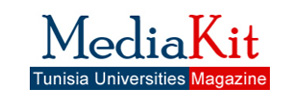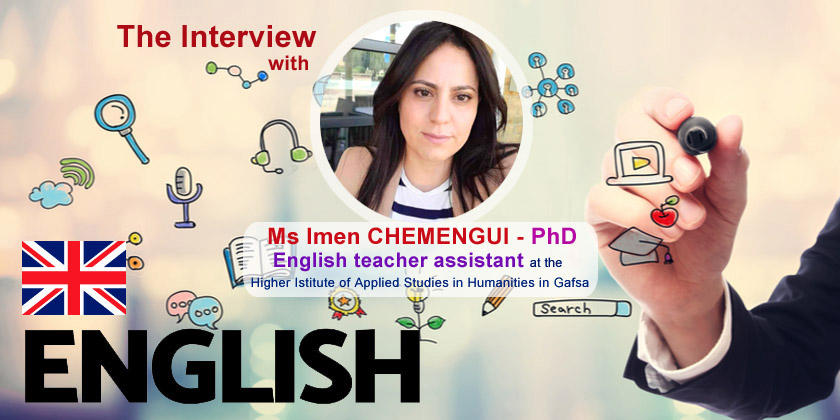The editor in chief of Tunisia Universities Magazine, had the pleasure of meeting Ms Imen CHEMENGUI to interview her about the importance of the English language in student life and in the business world.
Imen Chemengui is a teacher assistant at the Higher Istitute of Applied Studies in Humanities in Gafsa. She holds a PhD in English literature and Civilisation from Manouba university. The scope of her research revolves around Postcolonial literature, trauma studies and literature of Diaspora and migration. She has been teaching English for almost 12 years. She taught different subjects for ESP students like Business English, Medical English, English for aviation and Legal English, and now she is delivering classes in literary studies.
The Interview
Mehdi KANTAOUI : Why did you choose to major in English Language ?
Imen CHEMENGUI : Well, although I had a passion for learning languages from a very young age, I never thought of majoring in a specific language because I was studying Math. I developed a special interest in English during my two last years at secondary school. My friends and I were fond of listening to English songs,and we were incessantly competing to write the lyrics. We used to learn these songs by heart.. you know the Music of the 90’s was very special and many songs are still considered a hit till today. I later on felt keen on reading more about the culture and history of the language. That’s why I chose English as a major after passing my baccalaureate. I consider English a gateway for those who would like to have more educational and professional opportunities. It is important as it is the language employed worldwide for business and education. Hence, those who don’t master English will inevitably face some setbacks and miss opportunities.

Mehdi KANTAOUI : What makes English such an important language for university studies ?
Imen CHEMENGUI : Well this isa very important question. Some students are still not aware of the importance of learning English at universities irrespective of their major. It is important simply because it is the language used for research, trade and politics…you know, university studies are mainly based on research especially for those who aspire to conduct postgraduate studies. English increases the chance for researchers to get published in renowned and scholarly journals. It is also important for researchers as it helps them to get scholarships in overseas countries. Mastering English is undoubtedly of paramount importance for all fields of studies.

Mehdi KANTAOUI : What advice do you have for Tunisian students who are struggling to get to grips with the English language ?
Imen CHEMENGUI : This is a question that is recurrently asked by several students who some of them think that languages are more acquired than learned.. or who simply consider learning languages a talent. I personally object to such a view , and I always tell those who would like to learn a new language that the task is not difficult at all, and that they can cultivate their rudimentary knowledge about the language they aspire to learn regardless of their age, class, social environment and culture. The one key for this is immersive learning. They should simply embroil thelselves in real situations through incessant exposure to the language. This can only happen through creating an English atmosphere through repetitive, deep and active reading and listening. Writing also is of great importance because you know if you learn a new word or expression or whatever and you don’t use it you will for sure lose it. There are several ESL websites that students can use to enhance their English. They can also get involved in online conversations and debate clubs and get in touch with native speakers. This is extremely crucial to get rid of language axiety and the frustration some students might feel when starting a conversation with English speakers.

Mehdi KANTAOUI : Do the various English language training centers in Tunisia really help to improve the level of Tunisian citizens living in a French-speaking society ?
Imen CHEMENGUI : This is indeed a timely question that we should ponder on especially that the education system in Tunisia is still employing French as its first language of teaching and research, which I personally deem as a flaw that requires a radical overhaul. The Tunisian educational system should stop going upstream, otherwise we will remain lagging behind as far as education and employment in the international job market are concerned. One of the difficulties or even setbacks our graduates are facing nowadays emanate mainly from following an obsolete system. This does not mean that French is not an important language..I don’t want to be misunderstood. I personally believe that our students should be polyglots because the more languages students master, the more chance they will get to seize opportunities internationally. However, using English as the language of teaching in different disciplines would inevitably be a paradigm shift that would save students’ time and effort after graduation. And here I come to your question about training centers. I think it would be more interesting and of greater help for our students to get immersed in the English language from a very young age because this would make learning much easier. Many people seek training centers to enhance their English, which could of course be helpful. However, language acquisition needs time and patience, so the number of hours people spend in training centers is not necessarily always enough to master a particular language.English is indeed a global lingua-franca, so it is crucial for decision-makers to think seriously of using it as the main language in education.

Mehdi KANTAOUI : What recommendations do you usually give to your students in terms of fields of activity to follow in their future professional lives ?
Imen CHEMENGUI : I think majoring in Entrepreneurial and business fields is of great importance nowadays, especially that the unemployment rate is soaring on a yearly basis in the public sector. We in Tunisia need a different mindset that fosters the creation of small businesses and empowers the youth who want to forge a future in entrepreneurship. Unfortunately in our country we still need to learn how to bridge the gap between what people major in and the career they want to pursue. Also, red-tape and the lack of communication between graduates and the Tunisian administration constitute a real problem that holds youth back and stunts their progress. Many give up on their start-ups because of the impass they experience with the Tunisian administration. Boosting our youth’s creativity and encouraging them through micro-finance and funding programs, training and suppervision is becoming crucial. It is also important to teach them the importance of pitching that inevitably opens doors on the long-run. And the most important key for succeeding a business is timing, which I think plays a pivotal role in both the success and imperishability of a start-up. You know due to the cut-throat competition in the market new entrepreneurs might find it difficult to resist the existence of some ventures, and this could discourage them toinvest in the market because they would probably risk money, time and experience.

Mehdi KANTAOUI : Given the importance of the English language in today’s world, isn’t there a risk of it being replaced by another language in the future ?
Imen CHEMENGUI : well despite the rise of other languages like chinese, Korean etc.., I think that the risk of English losing its importance is far-fetched because its significance pertains to a long history of economic, colonial and geopolitical factors. This does not deny the fact that other languages are important, but still English pervades the globe, and in order to come to grips with what is going on around the world,be up to date with recent breakthroughs in different disciplines, and communicate well with the world, we should consider mastering English a priority.
Interview directed by Mr Mehdi KANTAOUI, The editor in chief of Tunisia Universities Magazine
Stay connected and informed. Follow us on Facebook















What an intelligent evaluation of the necessity and usefulness for learning English! Your students must be very happy to have you as their professor. Congratulation
Excellent Job
Very nice work with such good arguments
Bravo, a great interview to promote the English language.
Une brillante interview
Un super beau et intelligent support électronique. Bravo pour l’interview.
Une belle analyse de la part de Imen English teacher assistant et des questions intelligentes de la part du journaliste Mehdi